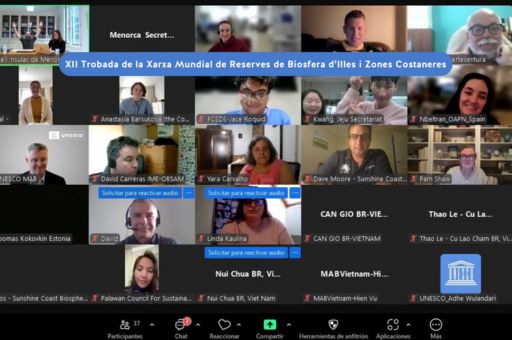During the CONFERENCE, the six new biosphere reserves joining the Network were also welcomed.
This week saw the 12th Meeting of the World Network of Coastal Islands and Coastal Zones Biosphere Reserves, a virtual session that brought together more than 40 experts, managers and representatives of biosphere reserves from around the world. The meeting was important to maintain contact with network members and to share updates on the network, as well as to continue shaping the network’s contribution to the new 10-year Strategic Plan of the MaB Programme.
The meeting began with a welcome from the representatives of the biosphere reserves of Menorca and Jeju (Republic of Korea), which make up the secretariat of the Network. During his speech, the councillor for the Environment, Biosphere Reserve and Local Cooperation of the Consell Insular de Menorca, Simón Gornés, stressed the importance of maintaining collaboration between reserves to face global environmental challenges. ‘Despite the distance, this virtual space allows us to strengthen relationships, share knowledge and move forward together towards a more sustainable management of our islands and coastal areas’.
TDB keeps you informed. Follow us on: Facebook, Twitter and Instagram
The World Network of Island and Coastal Biosphere Reserves is holding its 12th virtual meeting
During the open discussion, several issues relevant to the future of the network were addressed. Special emphasis was placed on the need for greater youth representation within Biosphere Reserves, highlighting the work of the MAB Youth Networks and sharing experiences on the creation of youth networks in various reserves. It was discussed, for example, how participation in a previous network meeting inspired the creation of the MAB UK and Ireland Committee, as well as the appointment of youth representatives from these regions.
In addition, debate also arose on the terminology used to describe Biosphere Reserves, as in some areas with a strong presence of indigenous communities, the term ‘reserve’ can have negative connotations. For this reason, some members have proposed the term ‘Biosphere Regions’ to reflect cultural and territorial diversity better.
Finally, interest was also expressed in organising an island network side event in Hangzhou 2025 and reserves were encouraged to consider hosting future meetings. The host of the last face-to-face meeting, Great Sandy BR (Australia), encouraged members to put themselves forward as potential hosts for future editions.
The minister also welcomed the six new biosphere reserves joining the network this year: Sunshine Coast (Australia), Can Gio (Vietnam), Nui Chua (Vietnam), YApayaos (Philippines), Mount Arrowsmith (Canada) and Mar Chiquito (Argentina).
He also stressed the importance of ensuring that island and coastal territories have a strong voice in developing the new MaB Programme Strategic Plan, which will be one of the outcomes of the next World Conference of Biosphere Reserves, to be held in Hangzhou, China, in September 2025. ‘It is essential that our island and coastal territories are represented in this global process to ensure that their specific challenges and needs are addressed in international environmental policies.’
